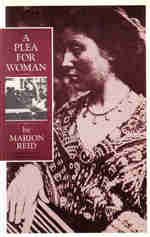Marion Reid 1815-1902
 Marion was the only Scotswoman present at the World anti-slavery convention in London in 1840. She listened to the men debate as to whether the women in the American delegation should have the right to participate. The men voted to refuse them which resulted in all members of the affected delegations walking out. Marion met with the Women's leader Lucretia Mott. Influenced by this debate, Marion Reid wrote ‘Plea for Women’ (1843) which was probably the first work in Britain or the USA to give priority to achieving civil and political rights for women and was particularly influential in the USA in the first years of the Women’s suffrage movement.
Marion was the only Scotswoman present at the World anti-slavery convention in London in 1840. She listened to the men debate as to whether the women in the American delegation should have the right to participate. The men voted to refuse them which resulted in all members of the affected delegations walking out. Marion met with the Women's leader Lucretia Mott. Influenced by this debate, Marion Reid wrote ‘Plea for Women’ (1843) which was probably the first work in Britain or the USA to give priority to achieving civil and political rights for women and was particularly influential in the USA in the first years of the Women’s suffrage movement.
Aware of an earlier radical tradition, Marion noted that the democratic principals of the French revolution had not been applied to half the human race.
From A Plea for Women, Chapter 5: Woman's Claim To Equal Rights
"We shall now proceed to enumerate more precisely the disadvantages which, in this country, we conceive woman in general labours under. The principal of these seem to be:—
I. Want of equal civil rights.
II. Enforcement of unjust laws.
III. Want of means for obtaining a good substantial education.
Exercising rights would enable women’s interests to be represented and their grievances redressed. Such grievances included the laws oppressing married women, and the failure to provide girls with a good education not a s future wives and mothers but for their own fulfilment. In the only serious review of her work Christian Isobel Johnstone suggested that economic independence for women was an even higher priority than political rights.
Marion was also a member of the "Ladies National Association for the Repeal of the Contagious Diseases Acts".
